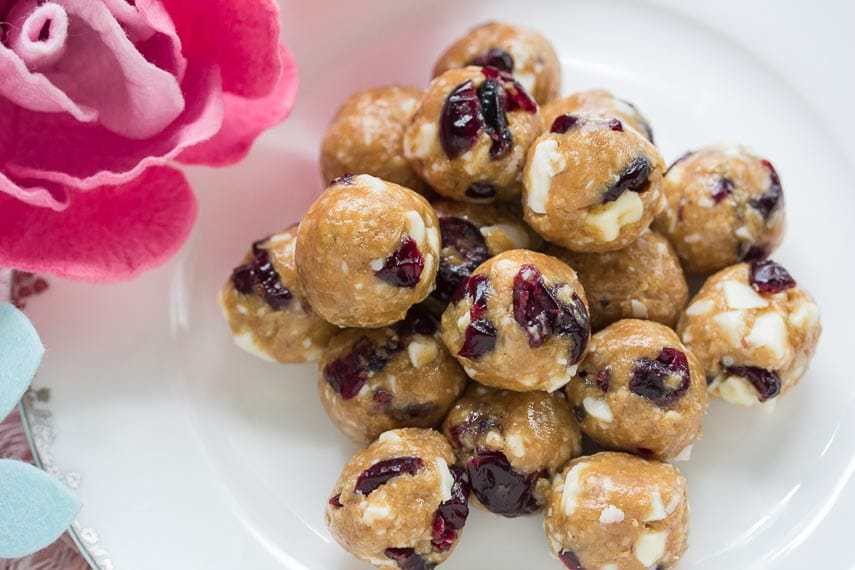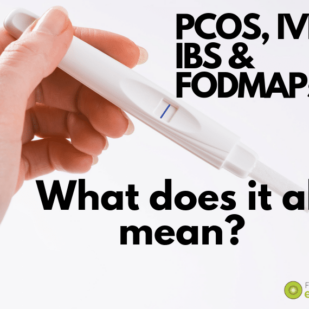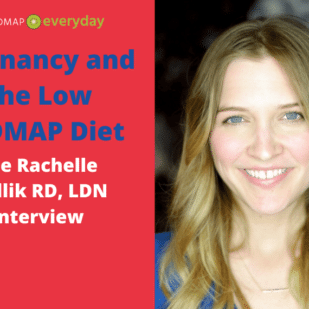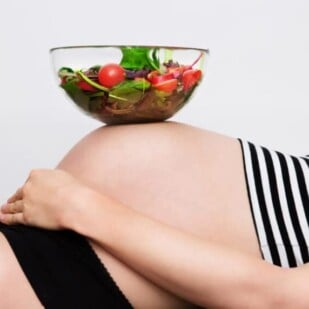Postpartum Nutritional Needs & IBS
Intro: This article Postpartum Nutritional Needs & IBS is Part 3 of a multi-part series on preconception, pregnancy, postpartum and breastfeeding and IBS that we call the Pregnancy & IBS Series
It’s told from the perspective of Mollie Tunitsky, one of our favorite IBS/Low FODMAP bloggers and authors who shares her experience going from going IVF all the way through post-pregnancy challenges, such as breastfeeding.
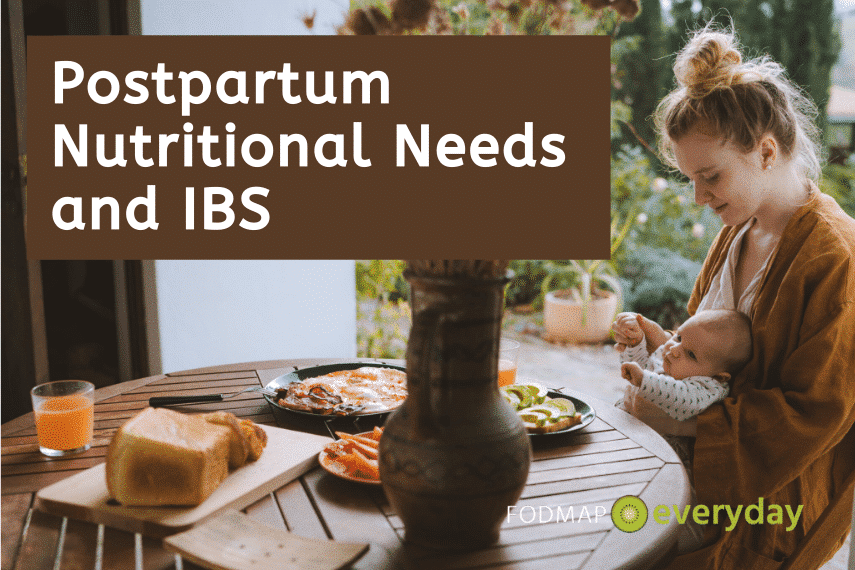
The series is co-presented with our Success Team RDN, Rachelle Mallik, whose special focus is on fertility, prenatal, postpartum and breastfeeding nutrition and gut health and also lives with IBS. Rachelle has been providing her supportive expertise for Mollie (and all of us) while also currently experiencing her second pregnancy.
Mollie’s Experience After The Baby
Having a newborn baby is a life altering experience where all of your focus immediately goes to this adorable but scary human being. Especially if you’re a first time parent like my husband and me, it quickly became an all-encompassing time where the hours felt long but the days flew by.
In the beginning it felt extremely overwhelming as my son and I were both trying to figure out how to mesh together all the while waiting for my breast milk supply to come in. I was super excited that my GI symptoms, which flared up while I was pregnant, subsided almost instantaneously after I had my baby. Goodbye to my indigestion, trapped air and gas but hello to sleepless nights and breastfeeding!
Proper Nourishment Is Key Postpartum!
I knew ahead of time how important it was to nourish yourself in order to feed your little one during that postpartum period. I read many books before my little man arrived and thought I was prepared. I made freezer friendly low FODMAP food like soups, muffins, cookies and energy balls.
I thought I had it all ready to go and just needed to insert baby. HA! Very quickly I threw all that out the window and taking care of myself went to the bottom of the list. After feeling completely depleted the first few days, I promised myself that whenever I would nurse my baby I would make sure to eat and drink something myself. This made a huge difference in my energy levels as well as my breast milk production. Having nutrient rich low FODMAP foods available to eat, as well as whatever I was craving, really has helped the process.
Rachelle’s Guidance: What Your Body Needs
During breastfeeding, just like during the second two trimesters of pregnancy, you need additional calories in your diet to ensure adequate energy for making milk. The suggested calorie increase ranges from 330 – 500 a day.
Counting calories isn’t usually necessary as your body will most likely give you hunger cues reminding you to eat. Many of my clients report feeling hungry (and thirsty) all the time when breastfeeding.
The Fourth Trimester
Nourishing yourself in the “fourth trimester” or postpartum comes with a variety of challenges – lack of sleep, taking care of a newborn, having your hands full, learning how to breastfeed. But it’s important that you eat!
If you are breastfeeding, not only are you providing food for your baby, you are recovering from pregnancy and birth and need to replenish your body. Opt for nutritious foods that will help keep up your energy and provide the vitamins and minerals your baby needs from your milk.
Prenatal and postnatal multivitamins may provide some of the nutrients listed below in adequate quantities, especially the B vitamins like folate, thiamin, and B6; however, there is no standardization for multivitamins so different brands have different formulas. Additionally, foods provide a variety of nutrients like protein, fat, fiber and antioxidants.
If you’re breastfeeding and on a low FODMAP diet, the following are IBS-friendly foods that are rich in important nutrients for you and baby.
- Calcium (1000 mg): aged cheese; lactose-free milk, yogurt or kefir; fish with edible bones (such as sardines); firm tofu; broccoli, dark leafy greens such as bok choy, kale, collard greens
- Choline (550 mg): whole eggs, cod, edamame*
- Iodine (290 mcg): lactose-free dairy, fish/seafood, seaweed, iodized salt
- Folate (400 IU): leafy green vegetables, oranges, green beans*
- Magnesium (320 mg): almonds*, spinach, peanut butter, edamame*
- Thiamin (1.4 mg): pork, fish, canned lentils, seeds, walnuts*, enriched white rice
- Vitamin B6 (2.0 mg): poultry, meat, fish, potatoes, spinach, bananas*, fortified gluten-free corn flakes
- Zinc (12 mg): meat, poultry, seafood, eggs, seeds, lactose-free yogurt, oats
* Refer to the Monash FODMAP app for appropriate portion sizes
The Importance of Snacks
In order to get enough energy for breastfeeding and the hunger pangs that often come with it, you may want to eat two-three snacks daily in addition to your meals. While pastries and chips are fine to have sometimes, they’re not the most nutrient-dense, energizing options to sustain you through the day (and night).
Here are some easy, nutritious snack ideas to incorporate into your low FODMAP diet while breastfeeding.
- Lactose-free yogurt (170 g) (e.g. Green Valley Organics or Siggi’s) or 1 cup (240 ml) lactose-free kefir
- Smoothie: 1 cup (240 ml) lactose-free kefir, ⅓ small ripe frozen banana, 1 cup (50 g) baby spinach & 1 tablespoon peanut butter
- ½ cup (75 g) cantaloupe & ½ cup (113 g) lactose-free cottage cheese
- 2 brown rice cakes topped with 2 sliced hard-boiled eggs, 4 halved cherry tomatoes, salt & pepper
- ¼ cup (30 g) Roasted Chickpeas
- 2 PB & Chocolate Energy Balls
- FODY snack bars – Peanut Butter Chocolate Quinoa or Blueberry Almond
- 1 slice gluten-free or sourdough bread topped with 1 tablespoon almond or peanut butter + ¼ cup (40 g) blueberries
- Homemade trail mix with 10 almonds, 4 Brazil nuts, 10 banana chips, 1 tablespoon raisins, ¼ cup (15 g) shredded coconut[1][2] *
* For the trail mix, you could make a large batch and portion out into snack size baggies to take on-the-go.
You may also find you’re hungry if you’re up breastfeeding in the middle of the night. Make sure to keep a reusable water bottle on your nightstand to stay hydrated as well as some shelf-stable snacks, such as roasted peanuts or mixed nuts, dry cereal (such as Puffins or One Degree) or granola.
A Word On Galactagogues
There are various products on the market that claim to increase milk supply (galactagogues), including teas, cookies, and supplement capsules. While research is limited to show if these galactagogues are safe or effective, many women have reported using them during breastfeeding.
If you choose to use a galactagogue supplement, like a “mother’s milk” or lactation tea, be aware that fennel is often one of the main ingredients. According to Monash University’s FODMAP Food Guide, fennel tea is a source of oligos. If you’re sensitive to oligos, you should avoid teas containing fennel.
New Research On Colic & The Low FODMAP Diet
A randomized study published in November 2018 found that the low FODMAP diet significantly reduced crying-fussing time in infants with colic. For the study, breastfeeding mothers followed either a low FODMAP diet for 10 days or a typical Australian diet for 10 days, and then switched to the other diet.
[bctt tweet=”The results showed a 32% reduction in crying-fussing time among the breastfed infants of mothers following the low FODMAP diet.” username=”FODMAPeveryday”]
More research needs to be done on the mechanisms, but the authors conclude it could be a short-term intervention for breastfeeding mothers of colicky babies.
Before making this kind of dietary change, especially while breastfeeding and/or handling the demands of a newborn while healing from birth, please seek out guidance from a qualified dietitian.
Be sure to read all of our articles in our Pregnancy and IBS Series.
Resources
- Nutrition During Lactation. Institute of Medicine, Washington, DC, National Academy Press, 1991. https://www.ncbi.nlm.nih.gov/books/NBK235579/#ddd00228
- Maternal experiences with and sources of information on galactagogues to support lactation: a cross-sectional study. Int J Womens Health. 2017; 9: 105–113. Published online 2017 Feb 27. https://www.ncbi.nlm.nih.gov/pmc/articles/PMC5338995/
- Randomised clinical trial: reducing the intake of dietary FODMAPs of breastfeeding mothers is associated with a greater improvement of the symptoms of infantile colic than for a typical diet. Aliment Pharmacol Ther. 2018; 48:1061-1073. Published online 2018 Oct 10. https://www.ncbi.nlm.nih.gov/pubmed/30306603 and https://onlinelibrary.wiley.com/doi/full/10.1111/apt.15007
- Ward, Elizabeth. Expect the Best, Second Edition.

